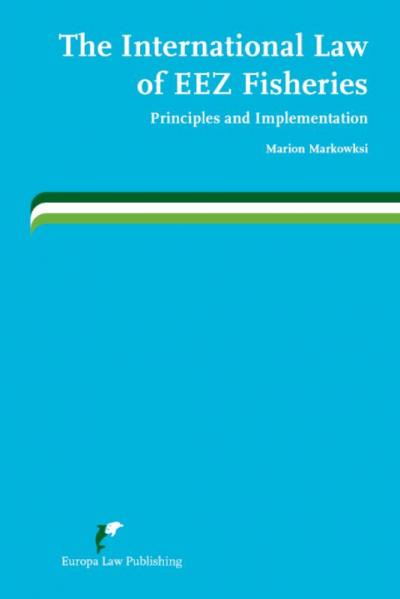As fish stocks continue to decline worldwide, coastal states seem to have largely failed in managing fisheries in their EEZs effectively. This study examines the international legal principles for effective EEZ fisheries management, and undertakes to assess their domestic implementation in a comparative perspective.
The 1982 UNCLOS as well as general international law provide a useful range of norms for sustainable EEZ fisheries management, if carefully interpreted. These include the coastal state?s obligation to ensure that the maintenance of the living resources in its EEZ is not endangered by over-exploitation; the duty to maintain or restore populations of target species at sustainable levels; the determination of catch limits for stocks affected by exploitation; and the duty to apply the precautionary approach. In addition to such environmental requirements, issues of distributive justice and procedural fairness are also included in the analysis.
The second part of the study evaluates the implementation of the international legal standards in five selected coastal states (Kenya, Namibia, Indonesia, Brazil and Mexico) and the EC. It focuses on the determination of total allowable catch, the allocation of individual fishing authorisations, and the regulation of foreign access to EEZ fisheries as exemplary management measures.
Abbreviations
Introduction
Part 1 International Legal Requirements on EEZ Fisheries Management
Chapter 1 Identifying Norms of International Law
1.1 So-called principles of international environmental law
1.2 Normative versus non-normative concepts
1.3 Sources of international law
1.3.1 Treaties
1.3.2 Custom
1.3.3 General principles of law
1.4 Conclusion
Chapter 2 Environmental Requirements on EEZ fisheries Management
2.1 Sovereign rights over fisheries resources
2.2 Conservation and sustainable use of fisheries resources
2.2.1 The 1982 UNCLOS
2.2.1.1 Primary obligations
2.2.1.2 The determination of total allowable catch
2.2.1.3 Non-target species
2.2.1.4 The role of scientific evidence
2.2.2 The UN Fish Stocks Agreement
2.2.2.1 Primary obligations
2.2.2.2 Non-target species
2.2.2.3 The role of scientific evidence
2.2.3 The Convention on Biological Diversity
2.2.4 Obligations under general international law
2.2.4.1 Propositions of norm-creating character
2.2.4.2 Opinio juris
2.2.4.3 State practice
2.2.4.4 The time element
2.2.4.5 Conclusion
2.3 The precautionary principle
2.3.1 The 1982 UNCLOS
2.3.2 The UN Fish Stocks Agreement
2.3.3 General international law
2.3.3.1 Normative quality
2.3.3.2 Acceptance as law
2.3.3.3 Conclusion
2.3.4 Impact of the precautionary approach on fisheries management
2.4 Transboundary cooperation
2.4.1 Fisheries treaties
2.4.2 General international law
Chapter 3 Foreign Access to EEZ Resources
3.1 Foreign access under UNCLOS
3.1.1 Identification of surplus
3.1.2 Allocation of the surplus
3.1.3 Coastal state regulations
3.1.4 Control and enforcement
3.2 The ‘surplus rule’ under custom
3.2.1 Coastal state discretion versus normative requirements
3.2.2 State practice
3.2.3 Conclusion
3.3 Outlook
Chapter 4 Human Rights Requirements on EEZ Fisheries Management
4.1 The right to property and fisheries management
4.1.1 Universal human rights instruments
4.1.2 Regional human rights treaties
4.1.3 General international law
4.1.4 Special protection of foreign property
4.1.5 Impact of the right to property on fisheries management
4.2 The rights of indigenous peoples and fisheries management
4.2.1 International treaties
4.2.2 General international law
4.2.3 Impact of indigenous rights on fisheries management
4.3 Equality and non-discrimination in fisheries management
4.3.1 Non-discrimination in the enjoyment of property
4.3.2 Autonomous non-discrimination rights
4.3.3 General international law
4.3.4 Impact of non-discrimination on fisheries management
4.4 The right to food and fisheries management
4.4.1 Legal status
4.4.2 Impact of the right to food on fisheries management
Part 2 Exemplary National Fisheries Legislation
Chapter 1 The Determination of Total Allowable Catch or Effort
1.1 Limiting exploitation
1.2 Conservation and sustainable use
1.2.1 Primary obligations
1.2.2 Protection of non-target species in the determination of TAC
1.2.3 Giving effect to the role of scientific evidence
1.3 Giving effect to the precautionary principle
1.4 Transboundary cooperation
Chapter 2 Allocation and Withdrawal of Individual Fishing Authorisations
2.1 The management systems employed
2.2 Potential conflicts with fishermen’s property rights
2.2.1 The cancellation, revocation and refusal to renew a fishing authorisation
2.2.2 Limits on the duration and transferability of fishing authorisations
2.2.3 Technical measures
2.3 Non-discrimination of fishermen
2.4 Protection of indigenous fishing activities
Chapter 3 Foreign Access to EEZs
3.1 Identification of surplus
3.2 Allocation of the surplus
3.3 Coastal state regulations
3.4 Control and enforcement
Conclusion
Table of cases
Table of national and EC legislation
Table of treaties
Table of other documents

